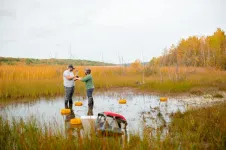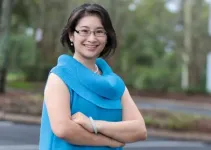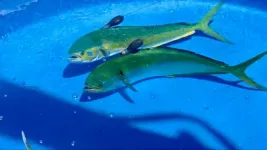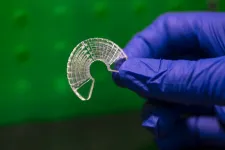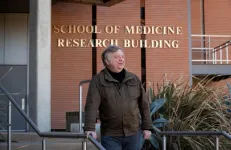(Press-News.org) Over the summer and fall, paper after paper revealed that mothers are one of the demographics hardest hit by the pandemic. From layoffs and leaving careers to do caretaking, to submission rate decreases and additional service projects, the data were clear, but the follow up less so. Many of the problems are not new and will remain after the pandemic. But a new paper, published this week in PLOS Biology, outlines methods to help solve them.
"In the spirit of the well-worn adage 'never let a good crisis go to waste,' we propose using these unprecedented times as a springboard for necessary, substantive and lasting change," write the 13 co-authors, led by researchers from Boston University and hailing from seven institutions, including Michigan Technological University, University of Connecticut, and University of Houston - Clear Lake. The team's goal: Solutions for retaining mothers in science during and after COVID-19, especially parents who are Black, Indigenous or people of color.
"The news was reporting these studies as if they were a surprise," said Robinson Fulweiler from Boston University, one of the lead authors alongside Sarah Davies, also of Boston University. Fulweiler adds, "There's already been a lot of data gathered about this issue. But there have been no solutions. Our level of frustration peaked. We decided we need to make a plan to fix things."
The paper offers specific solutions to different groups that can enact change:
Mentors: Know university parental leave policies, support and model a "healthy work-life teeter-totter" and keep mentees with child care duties engaged and involved in lab, department and multi-institution activities.
University administrators: Look up 500 Women Scientists, rethink tenure procedures and timelines, listen, provide course releases and avoid making "gender- or race-neutral policies because the effects of the pandemic are not neutral across race or gender."
Scientific societies: Consider how to keep parts of virtual conferences with lower costs, expand governing board diversity, expand networking opportunities and continue supporting early-career members, especially researchers who are Black, Indigenous, and people of color.
Publishers: Expand editorial boards and, during the pandemic, incentivize submissions through fee waivers for mothers with child care duties and keep extending deadlines for review and revisions.
Funding agencies: Streamline paperwork, ask for COVID disruption statements and look into supplemental and short-term bridge awards.
Mothers in the Pandemic
Amy Marcarelli, associate professor of biological sciences at Michigan Tech, helped lead the paper's section addressing professional societies. When the pandemic hit -- and Marcarelli had less than five days to shift all her classes and research to remote formats -- she was wrapping up a two-year strategic planning process with the Society for Freshwater Science that included a deep dive into effective and fair practices for diversity, equity and inclusion. She sees the work through her lens as an ecosystem ecologist.
"Some of my most recent work has been around cascading and indirect effects and how effects viewed on short time scales may have very different outcomes at long time scales," Marcarelli said. "What I've learned from that research is that you can't abstract a single characteristic of an organism and expect that to explain its ecological role. And [in academia] we try so often to treat ourselves as researchers -- and not as mothers and partners and daughters and leaders -- and that's to the detriment of all of us. It's to the detriment of us as individuals but it's also to the detriment of our academic system because if we don't treat people as whole people then we fail them."
Marcarelli emphasizes that she feels like she has been lucky during the pandemic; she secured tenure several years ago, her kid is older, Michigan K-12 schools reopened in September, and her mom, who was furloughed, helped with spring schooling and summer child care. While the extra service projects and retooling research, instruction and life were not easy, Marcarelli recognizes that not everyone's situation has been like hers.
The most pressing change Marcarelli sees is to rethink tenure extensions: "We have to figure out how to make motherhood and tenure compatible, not just extend tenure -- it's not a solution." She adds that the greatest challenge will be money. "These are inequities, but they are not inequities that everybody sees. And during a time of what is going to be an extended budget crisis in a lot of higher ed, that's going to be the hardest part. But it's the part that has to be solved because good intentions only get us so far."
Marcarelli says the conversation that sparked the PLOS Biology article started on Twitter, a lively back-and-forth on how to shift the dialogue to a solutions mindset.
"At the same time, several of us were working on big service activities around how to improve conditions for all different axes of diversity in our departments and universities, in our societies," she said. "We had invested a lot of thinking and real work that was going into small reports and small-scale documents that weren't going to be read widely."
The team's service work, lived experiences and hope informed the PLOS Biology paper as much as their research and collaboration.
"Part of the motivation for writing this article is that in some ways the pandemic provides a window into why this is important, why we need to do the hard work of dismantling these systems," Marcarelli said. "Quite frankly, it's an opportunity."
INFORMATION:
Collaborators
"While the data are clear that mothers are being disproportionally impacted by COVID-19, many groups could benefit from these strategies. Rather than rebuilding what we once knew, let us be the architects of a new world."
Robinson Fulweiler and Sarah Davies, Boston University
Jennifer Biddle, University of Delaware
Amy J. Burgin, University of Kansas
Emily Cooperdock and Carley Kenkel, University of Southern California, Los Angeles
Torrence Hanley, Northeastern University
Amy Marcarelli, Michigan Technological University
Catherine Matassa, University of Connecticut
Talea Mayo, Emory University
Lory Santiago-Vazquez, University of Houston - Clear Lake
Nikki Traylor-Knowles, University of Miami
Maren Ziegler, Justus Liebig University Giessen
Language difficulties and cultural barriers keep an "alarming" number of Chinese Americans from asking for cancer screenings that may protect their health, according to a new University of Central Florida study.
Su-I Hou, professor and interim chair of UCF's Health Management & Informatics Department, said her results show that physicians and members of the Chinese community need to improve their communication about the importance of cancer screenings. Her study was recently published in the Asian Pacific Journal of Cancer Prevention.
Hou surveyed 372 ...
PHILADELPHIA (March 9, 20201) - The PhD degree prepares nurse scientists to advance knowledge through research that improves health, translates into policy, and enhances education. However, as the role of the nurse has changed, and health care has grown more complex, there is a need to re-envision how PhD programs can attract, retain, and create the nurse-scientists of the future and improve patient care.
To begin the dialog about the future of PhD education in research-intensive schools, the University of Pennsylvania School of Nursing (Penn Nursing) invited 41 educational, governmental, professional, and philanthropic institutions to ...
MIAMI--In the Florida Straits at night, and under a new moon is the preference for spawning mahi-mahi, according to a new study by scientists at the University of Miami (UM) Rosenstiel School of Marine and Atmospheric Science.
These new details on the daily life of the highly sought-after migratory fish can help better manage their populations and provide scientists with new information to understand the impacts to the animal from changing environmental conditions.
To uncover these important details about the behaviors of mahi-mahi, or dolphinfish, the research team tagged captive spawning ...
WOODS HOLE, Mass. -- A long-lasting, successful relationship between scientists at the MBL Ecosystems Center and the citizen-led Buzzards Bay Coalition has garnered a long-term record of water quality in the busy bay that lies west of Woods Hole. That record has already returned tremendous value and last week, it was published in Scientific Data, a Nature journal.
"We hope getting this data out will encourage scientists to use it to test new hypotheses and develop new insights into Bay health," said Rachel Jakuba, science director of the Buzzards Bay Coalition and lead author of the journal article.
Since 1992, a large and dedicated team of citizen volunteers, dubbed Baywatchers, has been ...
News Release -- LOGAN, UT -- Mar. 9, 2021 -- Researchers at Utah State University are using silkworm silk to grow skeletal muscle cells, improving on traditional methods of cell culture and hopefully leading to better treatments for muscle atrophy.
When scientists are trying to understand disease and test treatments, they generally grow model cells on a flat plastic surface (think petri dish). But growing cells on a two-dimensional surface has its limitations, primarily because muscle tissue is three-dimensional. Thus, USU researchers developed a three-dimensional cell culture surface by growing cells on silk fibers that are wrapped around an acrylic ...
COLUMBUS, Ohio - A new SARS-CoV-2 vaccine candidate, developed by giving a key protein's gene a ride into the body while encased in a measles vaccine, has been shown to produce a strong immune response and prevent SARS-CoV-2 infection and lung disease in multiple animal studies.
Scientists attribute the vaccine candidate's effectiveness to strategic production of the antigen to stimulate immunity: using a specific snippet of the coronavirus spike protein gene, and inserting it into a sweet spot in the measles vaccine genome to boost activation, or expression, of the gene that makes the protein.
Even with ...
Delaying second doses of COVID-19 vaccines should reduce case numbers in the near term. But the longer-term case burden and the potential for evolution of viral "escape" from immunity will depend on the robustness of immune responses generated by natural infections and one or two vaccine doses, according to a Princeton University and McGill University study published March 9 in the journal Science.
"Several countries including the United Kingdom and Canada have stated that they will delay second doses of COVID-19 vaccines in response to supply shortages, but also in an attempt to rapidly increase the number of people immunized," said lead author Chadi Saad-Roy, a Ph.D. candidate in Princeton's Lewis-Sigler Institute for Integrative ...
Members of the COVID-19 Primary Care Database Consortium explain how the use of big data containing millions of primary care medical records provides an opportunity for rapid research to help inform patient care and policy decisions during the COVID-19 pandemic. Established in April 2020, the Consortium brings together experts in big data, epidemiology, intensive care, primary care and statistics, as well as journal editors, patient and public representatives, and front-line clinical staff from the universities of Oxford, Cambridge, Southampton, Bristol and Nottingham
The consensus statement that the consortium has developed and described in the article aims to facilitate transparency and rigor in methodological approaches, as well as consistency in defining and reporting ...
Members of the Perelman School of Medicine at the University of Pennsylvania and its health system developed and implemented a new model of collaborative care called The Penn Integrated Care (PIC) program. PIC includes a resource center to support intake, triage and referral management and collaborative care services in primary care practices. PIC was created to increase access to and engagement with mental health professionals to improve mental and physical health outcomes. Primary care physicians were able to refer patients with any mental health symptom or condition to PIC. In 12 months, 6,124 unique patients were referred from eight primary care clinics to either the PIC Resource Center or were connected with a mental health professional. ...
RIVERSIDE, Calif. -- Variants of the coronavirus are appearing in different parts of the world, many of them spreading with alarming speed. One contagious variant is the South African, or SA, variant, identified by an international team of researchers, including biomedical scientists from the University of California, Riverside.
"The new COVID-19 variants are the next new frontier," said Adam Godzik, a professor of biomedical sciences in the UC Riverside School of Medicine and a member of the research team that made the discovery. "Of these, the ...
